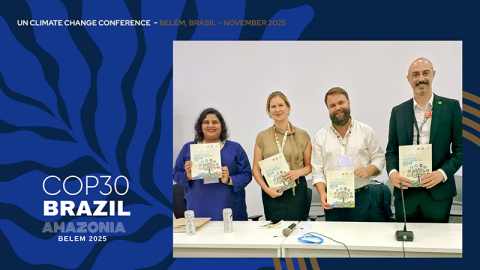TERI Launches Policy Brief on Strengthening Climate Multilateralism at COP30

The Policy Brief urges institutional reforms to rebuild trust, equity, and effectiveness in the multilateral climate process.
Belém, Brazil | 11 November 2025: The Energy and Resources Institute (TERI) unveiled its latest Act4Earth COP Compass publication, titled “Strengthening Multilateralism on the Road to COP33 and Beyond”, during a high-level side event at COP30 — “Beyond 2025: A New Climate Multilateralism?”. The session, held at the Blue Zone in Belém, featured Dr Shailly Kedia, Director and Senior Fellow, TERI, as the lead speaker, who deliberated on the urgent need for reforming the architecture of global climate governance.
The Policy Brief, authored by Dr Abhilash Kolekar, Dr Shailly Kedia, and Ms Ishita Srivastava; and reviewed by Mr RR Rashmi, argues that the current multilateral system—while foundational in advancing global cooperation—must evolve to remain credible and effective in the face of escalating climate risks and widening implementation gaps.
On the theme of the session, Dr Shailly Kedia, Director and Senior Fellow, TERI highlighted, “A new multilateralism is not about dismantling what exists—it is about reinforcing global cooperation in line with what climate science demands. Beyond strengthening UNFCCC-related processes, this new approach must also engage a broader multilateral system. For instance, repurposing the UN Trusteeship Council to safeguard the global commons—such as the high seas and the Central Arctic Ocean—can help protect some of the planet’s most vulnerable ecosystems.”
Emphasizing the need for strengthened multi-level governance, Ms Cecilia Kinuthia-Njenga, Director, Intergovernmental Support and Collective Progress, United Nations Framework Convention on Climate Change underscored, “Our job is not to fight one another; it is to fight the climate crisis together. Multilateralism is dynamic, not static. We need collaborative, action-oriented politics that connect global decisions with local realities.”
On the importance of COP presidency and the relevance of multilateralism, Mr Ethan Spaner, International Policy Senior Advisor, The Climate Reality Project, averred, “Presidencies can catalyse ambition by centring science, improving procedures, and connecting commitments to delivery. Building trust and strengthening the COP as the premier multilateral space for climate action at this critical moment starts at the top, with a COP president who leads by example. This means sidelining fossil fuel actors with no interest in climate action, committing to science-based solutions, and welcoming those most affected by the crisis into the conversation. A COP President has an incredible opportunity to show the world what ambition means and set a standard for all COP presidents to come.”
Mr RR Rashmi, Distinguished Fellow, TERI and India’s former Principal Climate Negotiator at UNFCCC, shared, “The multilateral system today faces considerable stress and, some might argue, even existential threat. There are growing attempts in various quarters to weaken or disrupt it. This calls for a renewed sense of caution and reflection about the future of multilateralism — not only in addressing climate change but across the entire spectrum of global governance.”
Dr Abhilash Kolekar, Research Associate, TERI, and lead author of the policy brief said, “As the climate crisis intensifies, the UNFCCC’s effectiveness will depend on its ability to adapt to evolving scientific realities, ensure inclusive participation, and address challenges that transcend national boundaries. Strengthening multilateral climate governance through timely and equitable reform is not merely desirable—it is essential.”
Key Findings
The Policy Brief identifies five institutional dimensions—scope, membership, decision-making, functions, and form—that require transformation to make the UNFCCC process more responsive, inclusive, and science-driven. The key recommendations include:
- Scope: The UNFCCC’s fragmented mandate and weak interlinkages call for expanding its scope to cover global commons, integrate justice and sectoral priorities, and align with the SDGs.
- Membership: State-centric participation and inequities demand reforms to institutionalize inclusivity, strengthen representation for the global commons, and support Least Developed Countries (LDCs) and Small Island Developing States (SIDS).
- Decision-making: Procedural rigidity and imbalance require formal voting rules, equity metrics, scientific advisory mechanisms, and streamlined, transparent negotiations.
- Functions: Overlaps, weak compliance, and unstable finance necessitate streamlined COP–CMA coordination, predictable funding, and stronger accountability mechanisms.
- Form: Fragmented coordination and limited scientific capacity highlight the need for an inter-conventions mechanism, a repurposed UN Trusteeship Council for global commons stewardship, and an enhanced science coordination platform.
The paper concludes that COP33, coinciding with the second Global Stocktake in 2028, could serve as a defining moment to institutionalize these reforms—restoring trust and ambition in global climate governance.
The discussion at COP30—anchored in the ethos of Vasudhaiva Kutumbakam (“the world is one family”)—called for rebuilding trust, strengthening institutional legitimacy, and embedding justice and equity at the heart of climate multilateralism. As the Policy Brief notes, these reforms can transform the UNFCCC into a more inclusive, accountable, and science-informed framework for collective action on climate change.
To read the complete Policy Brief, click here.
